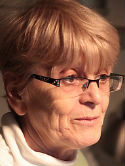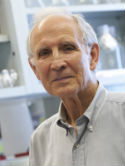The W(sh) and Ph mutations affect the c-kit expression profile: c-kit misexpression in embryogenesis impairs melanogenesis in W(sh) and Ph mutant mice Journal Article
| Authors: | Duttlinger, R.; Manova, K.; Berrozpe, G.; Chu, T. Y.; DeLeon, V.; Timokhina, I.; Chaganti, R. S. K.; Zelenetz, A. D.; Bachvarova, R. F.; Besmer, P. |
| Article Title: | The W(sh) and Ph mutations affect the c-kit expression profile: c-kit misexpression in embryogenesis impairs melanogenesis in W(sh) and Ph mutant mice |
| Abstract: | The receptor tyrosine kinases (RTKs) c-kit and platelet-derived growth factor receptor a chain (PDG-FRa) are encoded at the white spotting (W) and patch (Ph) loci on mouse chromosome 5. While W mutations affect melanogenesis, gametogenesis, and hematopoiesis, the Ph mutation affects melanogenesis and causes early lethality in homozygotes. W-sash (W(sh)) is an expression mutation and blocks c-kit expression in certain cell types and enhances c-kit expression in others, including at sites important for early melanogenesis. We have determined the effect of Ph on c-kit expression during embryogenesis in Ph heterozygotes. Immunohistochemical analysis revealed enhanced c-kit expression in several cell types, including sites important for early melanogenesis. We propose that in both W(sh) and Ph mutant mice c- kit misexpression affects early melanogenesis and is responsible for the pigment deficiency. Moreover, we have defined the organization of the RTKs in the W/Ph region on chromosome 5 and characterized the W(sh) mutation by using pulsed-field gel electrophoresis. Whereas the order of the RTK genes was determined as Pdgfra-c-kit-flk1, analysis of the W(sh) mutation revealed that the c-kit and Pdgfra genes are unlinked in W(sh), presumably because of an inversion of a small segment of chromosome 5. The Ph mutation consists of a deletion including Pdgfra and the 3' deletion endpoint of Ph lies between Pdgfra and c-kit. Therefore, positive 5' upstream elements controlling c-kit expression in mast cells and some other cell types are affected by the W(sh) mutation and negative elements are affected by both the W(sh) and the Ph mutation. |
| Keywords: | immunohistochemistry; platelet derived growth factor; oncoprotein; gene mutation; genetics; mutation; proto-oncogene proteins; nonhuman; molecular genetics; polymerase chain reaction; mouse; animal; mice; gene; stem cell factor receptor; proto oncogene; gene expression; melanin; embryo; embryo development; platelet derived growth factor receptor; protein tyrosine kinase; mice, inbred c57bl; physiology; cell type; pigmentation; biosynthesis; dna; molecular sequence data; nucleotide sequence; base sequence; receptor protein-tyrosine kinases; dna primers; primer dna; mouse strain; melanogenesis; receptors, platelet-derived growth factor; chromosome map; pulsed field gel electrophoresis; chromosome mapping; mast cell; proto-oncogenes; chromosome 5; restriction mapping; colony stimulating factor receptor; priority journal; article; support, u.s. gov't, p.h.s.; dna probe; proto-oncogene protein c-kit; receptors, colony-stimulating factor; proto oncogene protein c kit; proto oncogene proteins; receptor protein tyrosine kinases; receptors, colony stimulating factor; receptors, platelet derived growth factor |
| Journal Title: | Proceedings of the National Academy of Sciences of the United States of America |
| Volume: | 92 |
| Issue: | 9 |
| ISSN: | 0027-8424 |
| Publisher: | National Academy of Sciences |
| Date Published: | 1995-04-25 |
| Start Page: | 3754 |
| End Page: | 3758 |
| Language: | English |
| DOI: | 10.1073/pnas.92.9.3754 |
| PUBMED: | 7537375 |
| PROVIDER: | scopus |
| PMCID: | PMC42040 |
| DOI/URL: | |
| Notes: | Article -- Export Date: 28 August 2018 -- Source: Scopus |
Altmetric
Citation Impact
BMJ Impact Analytics
MSK Authors
-
 11
11Berrozpe -
 785
785Zelenetz -
 161
161Manova-Todorova -
 391
391Chaganti -
 115
115Besmer
Related MSK Work



